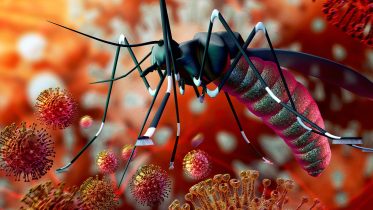
Zika virus
Zika virus is a member of the virus family Flaviviridae. It is spread by daytime-active Aedes mosquitoes, such as A. aegypti and A. albopictus. Its name comes from the Ziika Forest of Uganda, where the virus was first isolated in 1947. Zika virus shares a genus with the dengue, yellow fever, Japanese encephalitis, and West Nile viruses. Since the 1950s, it has been known to occur within a narrow equatorial belt from Africa to Asia. From 2007 to 2016, the virus spread eastward, across the Pacific Ocean to the Americas, leading to the 2015–2016 Zika virus epidemic. The infection, known as Zika fever or Zika virus disease, often causes no or only mild symptoms, similar to a very mild form of dengue fever. While there is no specific treatment, paracetamol and rest may help with the symptoms. As of April 2019, no vaccines have been approved for clinical use, however a number of vaccines are currently in clinical trials. Zika can spread from a pregnant woman to her baby.

/https://tf-cmsv2-smithsonianmag-media.s3.amazonaws.com/filer_public/7c/e2/7ce2d5a9-ef6a-40ef-bfa6-427f17242ade/gettyimages-971015378_web.jpg)

